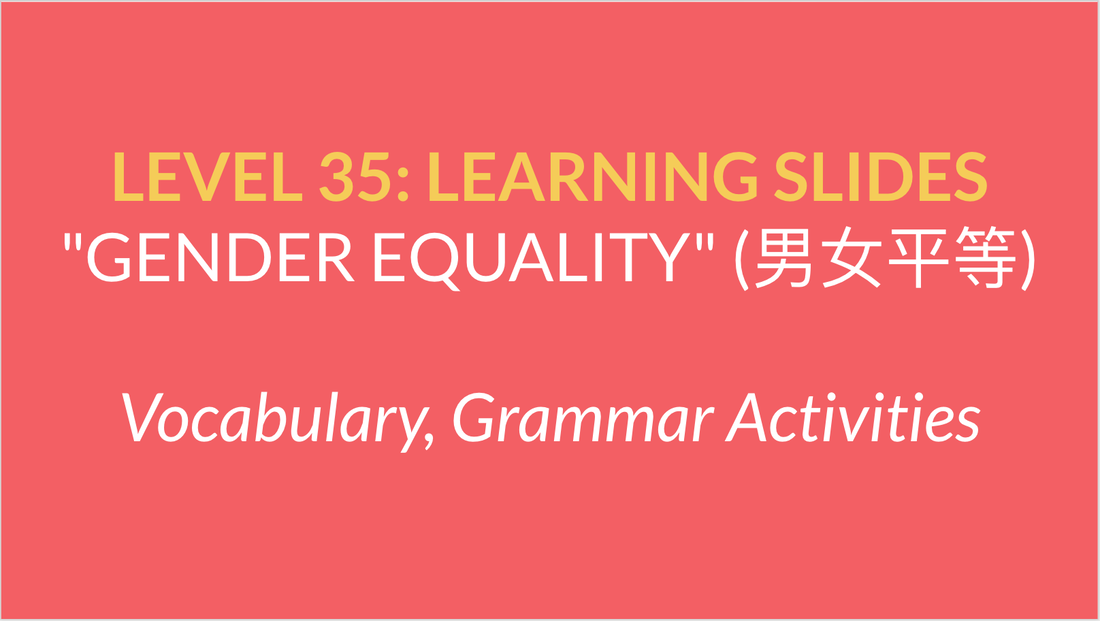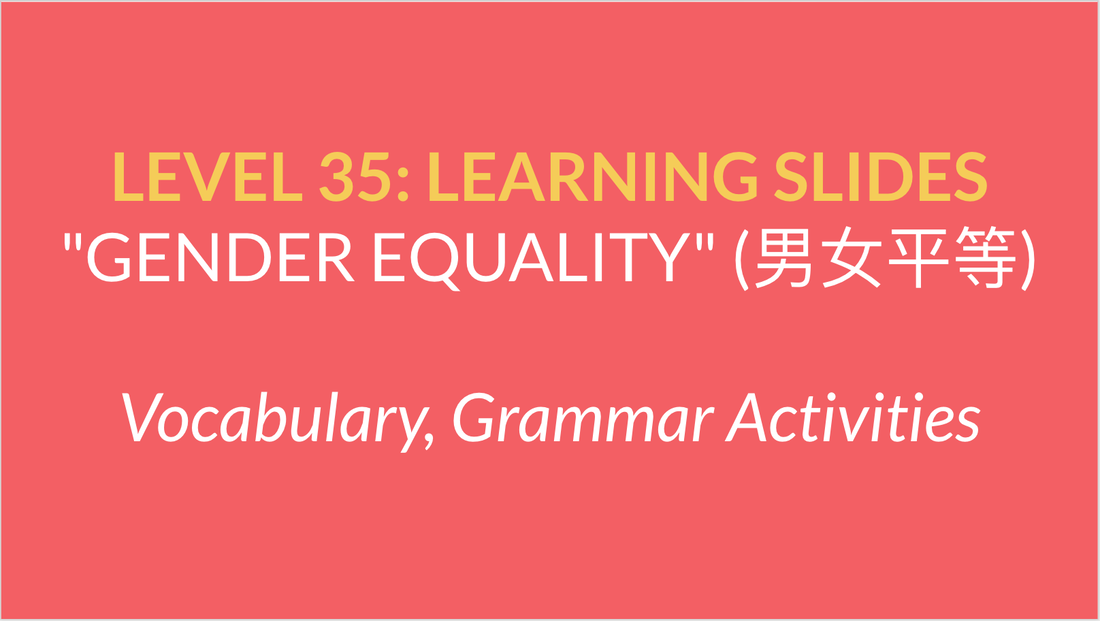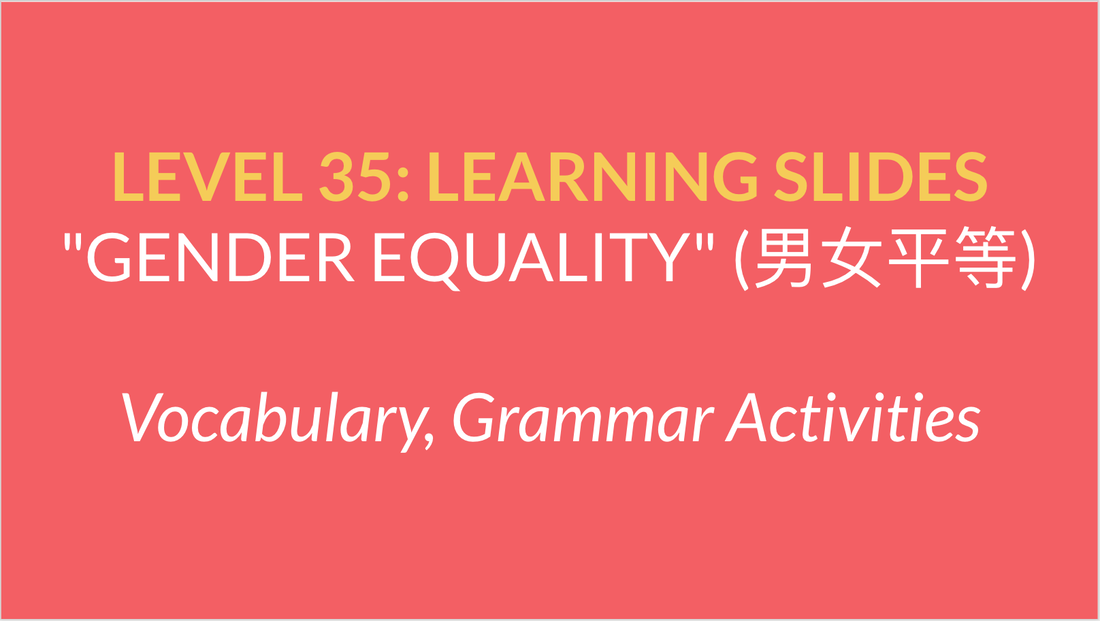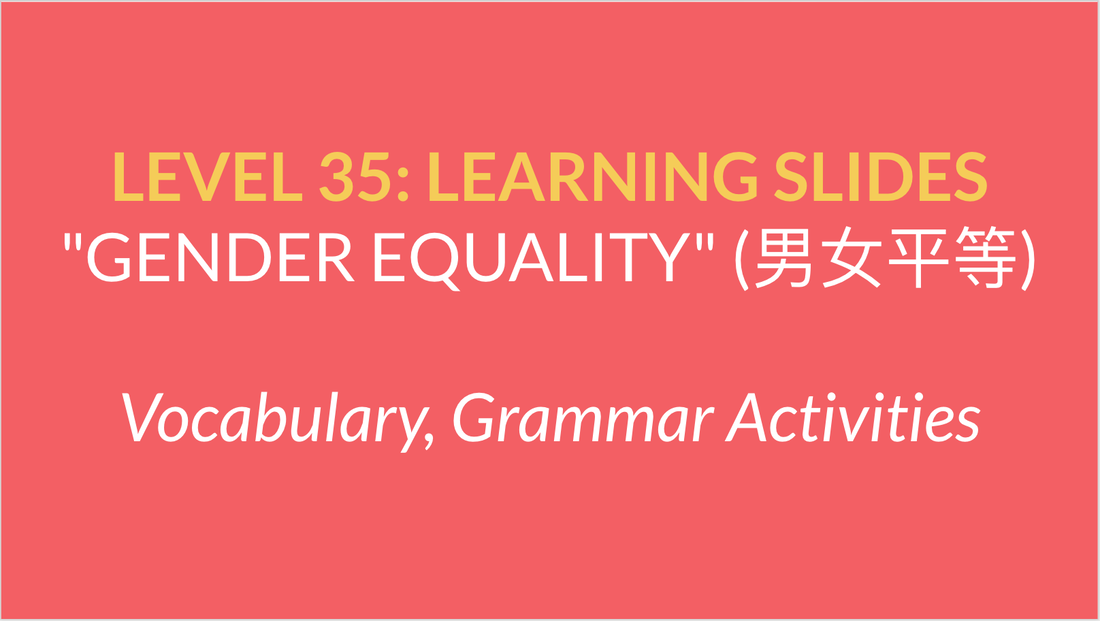Chapter 6: "24th Century Earth, the Glorious Utopia"
HOW TO TALK ABOUT GENDER EQUALITY
Preview
Lesson
Practice
Mastery
Preview
|
|
男女平等 (píng děng) equal; equality
平等 (píng děng) equal; equality
公平 (gōng píng) fair; just; impartial ; equitable
模范 (mó fàn) exemplary; fine example
男性 male gender [collective noun; polite] (nán xìng) 女性 female gender [collective noun; polite] (nǚ xìng) **BONUS WORDS**: **男人 men [refers to unfamiliar or indefinite people] (nán rén) **女人 women [refers to unfamiliar or indefinite people] (nǚ rén) **男子 man; male [used in gender-specific categories] (nán zi) **女子 woman; female [used in gender-specific categories] (nǚ zǐ) **男生 men [lit. male student] (nán shēng) **女生 women [lit. female student] (nǚ shēng) |
Lesson
Practice
SPEAK: form a discussion group with your classmates, focused on the topic of how to achieve social equality in the world.
WATCH: Listen to the song "不公平", by Jenny Yang. Write down some of the key lyrics.
WRITE: write an advertisement, recruiting people to live in a utopia you have created on an island off the southern coast of China.
WRITE: write a letter to your Chinese pen pal, telling him/her about an encounter you recently had with a strange assortment of men and women.
WRITE: respond to the following question: 男女平等是公平的观念,模范夫妻通常都会有这个观念,赞成这个观点。你们同意吗?
WATCH: Listen to the song "不公平", by Jenny Yang. Write down some of the key lyrics.
WRITE: write an advertisement, recruiting people to live in a utopia you have created on an island off the southern coast of China.
WRITE: write a letter to your Chinese pen pal, telling him/her about an encounter you recently had with a strange assortment of men and women.
WRITE: respond to the following question: 男女平等是公平的观念,模范夫妻通常都会有这个观念,赞成这个观点。你们同意吗?
Mastery
DICTATION: write the Chinese characters, English definition, and pinyin (including tones):
READING: read aloud the following sentences:
SPEAKING: perform the following conversation tasks:
- 男女平等,公平,模范,*男性*,*女性*,*男人*,*女人*,*男子*,*女子*,*男生*,*女生*
- TARGET: no more than 1 mistake, including tones.
READING: read aloud the following sentences:
- 中国家庭可能是现在中国社会男女最平等的地方。
- 不错,女足是比男足成绩好,可是我听说女足队员挣的钱不到男足的十分之一,真不公平。
- 舅舅忙着帮舅妈做饭,洗碗,又成了一位模范丈夫。
- TARGET: no more than 1 mistake, including tones.
SPEAKING: perform the following conversation tasks:
- Discuss the possibility and desirability of gender equality.
- Discuss other kinds of justice and equality.
- TARGET: at least a 3 on ALL tasks.
Chapter 7: "Unbowed, Unbent, Unbroken"
HOW TO COUNTER AN APPEAL
Preview
Lesson
Practice
Mastery
Preview
骄傲 (jiāo ào) proud; arrogant; full of oneself; pride
由 (yóu) by [prep]
拿...来说 (ná... lái shuō) take... for example
革命 (gé mìng) revolution; take part in revolution
- 你太骄傲了=You’re too arrogant.
- 我最讨厌那些男足队员了,平常骄傲得不得了,可是比赛的时候老输球。
由 (yóu) by [prep]
- object + 由 + subject (noun/pronoun) + verb
- 由 is a preposition. Its function is to introduce the agent performing an action. The agent is indicated by a noun or a pronoun.
- Used to emphasize the power or control of the subject/agent.
- Examples:
- 他的学习时间由你安排,我不担心。= His study hours are set by you. I don’t have to worry.
- 学什么专业由我自己选择,我父母不管。= It’s up to me to choose my major. My parents don’t interfere.
- 我的学费完全由父母负担。= My tuition is taken care of by my parents.
- 别忘了,他们的收入是由市场经济决定的。= Don’t forget, their income is determined by the market economy.
拿...来说 (ná... lái shuō) take... for example
- 拿 + noun (i.e. the example) + 来说, point to be made about that example.
- This structure is used to cite examples when making a point. The example is a noun, usually a person, place, or thing. Used like "比方说" or “比如”, but the example comes first in the structure, then the point to be made.
- Examples:
- 我们小区退休的老人都很喜欢运动,拿我爷爷来说吧,就天天锻炼,一天不锻炼,就觉得不舒服 = All the retirees in our residential subdivision love to exercise. Take my grandfather for example, he exercises every day. If he doesn’t exercise for even a day, he doesn’t feel well.
- 中国的变化很大,拿北京来说吧,老北京的样子几乎看不出来了。= China’s transformation has been tremendous. Take Beijing for example, you almost can’t see the old Beijing anymore.
- 拿林雪梅的舅舅来说吧,他是个大球迷。= Take Xuemei’s uncle for example--he is a big soccer fan.
革命 (gé mìng) revolution; take part in revolution
- 文化大革命 = Cultural Revolution (in China, 1966-1976)
- 法国大革命=French Revolution
- 科学革命=Scientific Revolution
- 教育革命= educational revolution
- 革命家=revolutionary
Lesson
Practice
WRITE: respond to the following question: 我是不是太骄傲了。看你说的,我不觉得。毕竟你常常反省自己。你们什么时候最骄傲?
WRITE: respond to the following question: 打仗由什么来决定?是因为革命的需要吗?你们赞同革命由打仗来实现吗?
WRITE: write a letter to someone with whom you have a long-standing feud.
WATCH: listen to "國民革命歌", or Chinese revolutionary songs.
SKIT: in a group, write a dialogue on the following prompt. Memorize your skit and perform in front of the class!
WRITE: respond to the following question: 打仗由什么来决定?是因为革命的需要吗?你们赞同革命由打仗来实现吗?
WRITE: write a letter to someone with whom you have a long-standing feud.
WATCH: listen to "國民革命歌", or Chinese revolutionary songs.
SKIT: in a group, write a dialogue on the following prompt. Memorize your skit and perform in front of the class!
- Two people are having a fight over the issue of gender equality.
- One person thinks men are superior to women, and he is very arrogant.
- Another person is more humble, but committed to equal rights for women.
- Use the words in Chapter 7.
Mastery
DICTATION: write the Chinese characters, English definition, and pinyin (including tones):
GRAMMAR: complete the following exercises:
READING: read aloud the following sentences:
SPEAKING: perform the following conversation tasks:
- 骄傲,由,拿...来说,革命
- TARGET: no more than 1 mistake, including tones.
GRAMMAR: complete the following exercises:
- Translate: Their income is determined by the economy.
- Translate: Take Xuemei's uncle for example...
- TARGET: no grammar mistakes.
READING: read aloud the following sentences:
- 我最讨厌那些男足队员了,平常骄傲得不得了,可是比赛的时候老输球。
- 他的学习时间由你安排,我不担心。
- 别忘了,他们的收入是由经济来决定的。
- 拿林雪梅的舅舅来说吧,他是个大球迷。
- 文化大革命对中国社会的影响很大。
- TARGET: no more than 1 mistake, including tones.
SPEAKING: perform the following conversation tasks:
- Talk about pride.
- Talk about revolutions.
- Counter an appeal with sophisticated rhetoric [using 由... or 拿...来说].
- TARGET: at least a 3 on ALL tasks.
Chapter 8: "The Revolution Begins: Cry of the Oppressed!"
HOW TO TALK ABOUT MUTUAL HELP
Preview
Lesson
Practice
Mastery
Preview
|
|
互相 (hù xiāng) mutually; each other
企业 (qǐ yè) enterprise; business; company; firm
事业 (shì yè) career; cause, undertaking
单位 (dān wèi) unit
|
Lesson
Practice
SPEAK: discuss ways to improve your relationship with family and friends.
READ: Read the Chairman's Bao article, "Richard Branson Meets Jack Ma In Show of Mutual Respect". Answer the following questions:
READ: Read the Chairman's Bao article, "From Duck Farmer in China to Riches - One Man's Incredible Journey". Answer the following questions:
WRITE: write about your potential future careers. Use the words in Chapter 8.
READ: Read the Chairman's Bao article, "Richard Branson Meets Jack Ma In Show of Mutual Respect". Answer the following questions:
- What is the connection between the two people named in the article?
- What are their stories?
- Summarize the article.
READ: Read the Chairman's Bao article, "From Duck Farmer in China to Riches - One Man's Incredible Journey". Answer the following questions:
- Who is the main person of interest in this article? What is his or her story?
- How many enterprises does he or she have? Name some of them.
- Translate the last sentence of the article into English: "现在,陈脉林已是南京市浦口区首富,但他不忘社会、不忘父老乡亲,在推动当地经济发展方面更是做出了极大的努力。"
WRITE: write about your potential future careers. Use the words in Chapter 8.
Mastery
DICTATION: write the Chinese characters, English definition, and pinyin (including tones):
READING: read aloud the following sentences:
SPEAKING: perform the following conversation tasks:
- 互相,企业,事业,单位
- TARGET: no more than 1 mistake, including tones.
READING: read aloud the following sentences:
- 在很多中国家庭中,丈夫和妻子都是互相照顾。
- 改革开放以来,在一些企业事业单位,又出现了男女不平等的现象。
- TARGET: no more than 1 mistake, including tones.
SPEAKING: perform the following conversation tasks:
- Talk about mutual help and assistance.
- Talk about careers and places of work.
- TARGET: at least a 3 on ALL tasks.
Chapter 9: "Open Your Eyes, Butcher!"
HOW TO TALK ABOUT PERFORMANCE
Preview
Lesson
Practice
Mastery
Preview
...过来 (guò lái) [abstract direction complement]
Examples:
1. 这几天他睡得太吵了,昨天睡得不错,都九点了,还没醒(xǐng=wake)过来呢。= He has been sleeping too little the past few days. Last night he slept pretty well; it's already nine o'clock, and he still hasn't woken up.
2. 老师给他讲了好几次,他才明白过来。= The teacher explained several times; only then did he get it.
休息过来 (xiū xi guò lái) to return to a state of rest [休息 + complement]
表现 (biǎo xiàn) to display; to manifest; performance
Examples:
1. 看见我的游戏机,弟弟表现出极大的兴趣 = Upon seeing my video game system, my younger brother showed a great deal of interest.
2. 比赛赢球,千万不要表现出骄傲的样子来 = When winning a ballgame, never, ever act superior to others.
3. 拿林雪梅的舅舅来说吧,他是个大球迷,只有在看电视的足球赛时候才表现出一点儿“大男子主义”,什么家务都不做。
4. 你舅舅呀,昨天晚上看球看到夜里一点,今天还不得好好表现表现?Last night your uncle watched a ball game until one o’clock. Today he’d better be on his best behavior, hadn’t he?
成绩 (chéng jì) score; grade; result; performance
Examples:
1. 中文课成绩 = Grades in Chinese class
2. “工作取得成绩,当然值得高兴,但不能骄傲。” = To obtain [a good] achievement in work, of course it’s worth being happy about, but one shouldn’t be arrogant
3. 不错,女足是比男足成绩好,可是我听说女足队员挣的钱只有男足的十分之一, 真不公平。= That’s right. Women’s soccer is better than men’s soccer, but I hear that women soccer players make only one tenth of what the men make. How unfair.
- structure:verb + 过来
- "过来 "is here used as a "abstract direction complement" following a verb. It expresses a resultative meaning: a return to a normal active state.
Examples:
1. 这几天他睡得太吵了,昨天睡得不错,都九点了,还没醒(xǐng=wake)过来呢。= He has been sleeping too little the past few days. Last night he slept pretty well; it's already nine o'clock, and he still hasn't woken up.
2. 老师给他讲了好几次,他才明白过来。= The teacher explained several times; only then did he get it.
休息过来 (xiū xi guò lái) to return to a state of rest [休息 + complement]
- 别,别,别,你们从云南旅游回来,就忙着找工作,面试,还没休息过来呢。= (xiū xi guò lái) to return to a state of rest [休息 + complement]
表现 (biǎo xiàn) to display; to manifest; performance
- 表现 is here used as a verb. It is often followed by 出 or 出来 as a complement (i.e. 表现出 or 表现出来)
Examples:
1. 看见我的游戏机,弟弟表现出极大的兴趣 = Upon seeing my video game system, my younger brother showed a great deal of interest.
2. 比赛赢球,千万不要表现出骄傲的样子来 = When winning a ballgame, never, ever act superior to others.
3. 拿林雪梅的舅舅来说吧,他是个大球迷,只有在看电视的足球赛时候才表现出一点儿“大男子主义”,什么家务都不做。
4. 你舅舅呀,昨天晚上看球看到夜里一点,今天还不得好好表现表现?Last night your uncle watched a ball game until one o’clock. Today he’d better be on his best behavior, hadn’t he?
成绩 (chéng jì) score; grade; result; performance
- “成绩” is often used for:
- 1) grades in school or on tests
- 2) achievement in work or projects
- 2) performance in a sports game [i.e. whether it was good or not]
Examples:
1. 中文课成绩 = Grades in Chinese class
2. “工作取得成绩,当然值得高兴,但不能骄傲。” = To obtain [a good] achievement in work, of course it’s worth being happy about, but one shouldn’t be arrogant
3. 不错,女足是比男足成绩好,可是我听说女足队员挣的钱只有男足的十分之一, 真不公平。= That’s right. Women’s soccer is better than men’s soccer, but I hear that women soccer players make only one tenth of what the men make. How unfair.
Lesson
Practice
TRAIN: write 3 sentences using the following grammar structure:
DETECTIVE: find and fix the mistakes (highlight to see the correct answer):
SPEAK: discuss the times you have performed badly, either in school, work, or life. Share the methods you used to recover from these poor performances.
WRITE: write a letter to your parents explaining why you received a bad grade on your Chinese exam.
READ: read the following passage and translate it into English:
在历史上,人的社会经过了许多变化。可是,从古代到现在,有一件事情从来没有变。女人的地位比男人的地位低。虽然最近有进步,我们现在的社会还是重男轻女。人的生活总会有令人难过的事,可是女人的困难比男人的困难严重很得多。不管上班或做家务,女人没有男人那么多机会,那么多自由。大男子主义的确创造了不公平的社会。看来,人类还有改进的余地。我们都生活在地球上,都应该有平等的机会。
- ...过来
DETECTIVE: find and fix the mistakes (highlight to see the correct answer):
- 对不起,老师,我知道我的中文成绩不好。这个星期太慢了,一直熬夜,没休息来。
- Answer: 休息过来 (verb + 过来, "过来" is the complement)
SPEAK: discuss the times you have performed badly, either in school, work, or life. Share the methods you used to recover from these poor performances.
WRITE: write a letter to your parents explaining why you received a bad grade on your Chinese exam.
READ: read the following passage and translate it into English:
在历史上,人的社会经过了许多变化。可是,从古代到现在,有一件事情从来没有变。女人的地位比男人的地位低。虽然最近有进步,我们现在的社会还是重男轻女。人的生活总会有令人难过的事,可是女人的困难比男人的困难严重很得多。不管上班或做家务,女人没有男人那么多机会,那么多自由。大男子主义的确创造了不公平的社会。看来,人类还有改进的余地。我们都生活在地球上,都应该有平等的机会。
Mastery
DICTATION: write the Chinese characters, English definition, and pinyin (including tones):
GRAMMAR: complete the following exercises:
READING: read aloud the following sentences:
SPEAKING: perform the following conversation tasks:
- 休息过来,表现,成绩
- TARGET: no more than 1 mistake, including tones.
GRAMMAR: complete the following exercises:
- Translate: You just got back from Yunnan, you haven't had a chance to recover [return to a state of rest]! [... 过来]
- Rule (in English): Explain both ways to use "...过来" that we've learned so far. Give examples.
- BONUS (Rule): in English, explain what an "abstract compound directional complement" is. What is this type of complement used for? How is ...过来 an example?
- BONUS (Rule): in English, list at least three different "abstract direction complements", and give examples.
- TARGET: no more than 1 grammar mistake.
READING: read aloud the following sentences:
- 老师给他讲了好几次,他才明白过来。
- 别,别,别,你们从云南旅游回来,就忙着找工作,面试,还没休息过来呢。
- 你舅舅呀,昨天晚上看球看到夜里一点,今天还不得好好表现表现?
- 工作取得成绩,当然值得高兴,但不能骄傲。
- TARGET: no more than 1 mistake, including tones.
SPEAKING: perform the following conversation tasks:
- Talk about returning to a normal state [such as 嗅嗅,醒,明白, etc].
- Talk about your performance and achievement.
- TARGET: at least a 3 on ALL tasks.
MINIBOSS #2: ACT 2 REVIEWMastery Challenge 1 (Vocabulary and Grammar):
Mastery Challenge 2 (Speaking):
BONUS CHALLENGES:
|
© 2019 Hugo Xiong. [email protected]








